- Home
- Neil Gaiman
How to Talk to Girls at Parties Page 2
How to Talk to Girls at Parties Read online
Page 2
‘But there was no reasoning with it, and I came to world. Parent-teacher engulfed me, and I was here, embodied in a decaying lump of meat hanging on a frame of calcium. As I incarnated I felt things deep inside me, fluttering and pumping and squishing. It was my first experience with pushing air through the mouth, vibrating the vocal cords on the way, and I used it to tell parent-teacher that I wished that I would die, which it acknowledged was the inevitable exit strategy from world.’
There were black worry beads wrapped around her wrist, and she fiddled with them as she spoke. ‘But knowledge is there, in the meat,’ she said, ‘and I am resolved to learn from it.’
We were sitting close at the centre of the sofa now. I decided I should put an arm around her, but casually. I would extend my arm along the back of the sofa and eventually sort of creep it down, almost imperceptibly, until it was touching her. She said, ‘The thing with the liquid in the eyes, when the world blurs. Nobody told me, and I still do not understand. I have touched the folds of the Whisper and pulsed and flown with the tachyon swans, and I still do not understand.’
She wasn’t the prettiest girl there, but she seemed nice enough, and she was a girl, anyway. I let my arm slide down a little, tentatively, so that it made contact with her back, and she did not tell me to take it away.
Vic called to me then, from the doorway. He was standing with his arm around Stella, protectively, waving at me. I tried to let him know , by shaking my head, that I was on to something, but he called my name and, reluctantly, I got up from the sofa and walked over to the door. ‘What?’
‘Er. Look. The party,’ said Vic, apologetically. ‘It’s not the one I thought it was. I’ve been talking to Stella and I figured it out. Well, she sort of explained it to me. We’re at a different party.’
‘Christ. Are we in trouble? Do we have to go?’
Stella shook her head. He leaned down and kissed her, gently, on the lips. ‘You’re just happy to have me here, aren’t you, darlin’?’
‘You know I am,’ she told him.
He looked from her back to me, and he smiled his white smile: roguish, lovable, a little bit Artful Dodger, a little bit wide-boy Prince Charming. ‘Don’t worry. They’re all tourists here anyway. It’s a foreign-exchange thing, innit? Like when we all went to Germany.’
‘It is?’
‘Enn. You got to talk to them. And that means you got to listen to them too. You understand?’
‘I did. I already talked to a couple of them.’
‘You getting anywhere?’
‘I was till you called me over.’
‘Sorry about that. Look, I just wanted to fill you in. Right?’
And he patted my arm and he walked away with Stella. Then, together, the two of them went up the stairs.
Understand me, all the girls at that party, in the twilight, were lovely; they all had perfect faces but, more important than that, they had whatever strangeness of proportion, of oddness or humanity it is that makes a beauty something more than a shop-window dummy. Stella was the most lovely of any of them, but she, of course, was Vic’s, and they were going upstairs together, and that was just how things would always be.
There were several people now sitting on the sofa, talking to the gap-toothed girl. Someone told a joke, and they all laughed. I would have had to push my way in there to sit next to her again, and it didn’t look like she was expecting me back, or cared that I had gone, so I wandered out into the hall. I glanced in at the dancers, and found myself wondering where the music was coming from. I couldn’t see a record-player or speakers.
From the hall I walked back to the kitchen.
Kitchens are good at parties. You never need an excuse to be there and, on the good side, at this party I couldn’t see any signs of someone’s mum. I inspected the various bottles and cans on the kitchen table, then I poured half an inch of Pernod into the bottom of my plastic cup, which I filled to the top with Coke. I dropped in a couple of ice-cubes, and took a sip, relishing the sweet-shop tang of the drink.
‘What’s that you’re drinking?’ A girl’s voice.
‘It’s Pernod,’ I told her. ‘It tastes like aniseed balls, only it’s alcoholic.’ I didn’t say that I’d only tried it because I’d heard someone in the crowd ask for a Pernod on a live Velvet Underground LP.
‘Can I have one?’ I poured another Pernod, topped it off with Coke, passed it to her. Her hair was a coppery auburn, and it tumbled around her head in ringlets. It’s not a hairstyle you see much now, but you saw it a lot back then.
‘What’s your name?’ I asked.
‘Triolet,’ she said.
‘Pretty name,’ I told her, although I wasn’t sure that it was. She was pretty, though.
‘It’s a verse form,’ she said, proudly. ‘Like me.’
‘You’re a poem?’
She smiled, and looked down and away, perhaps bashfully. Her profile was almost flat – a perfect Grecian nose that came down from her forehead in a straight line. We did Antigone in the school theatre the previous year. I was the messenger who brings Creon the news of Antigone’s death. We wore half-masks that made us look like that. I thought of that play, looking at her face, in the kitchen, and I thought of Barry Smith’s drawings of women in the Conan comics: five years later I would have thought of the Pre-Raphaelites, of Jane Morris and Lizzie Siddall. But I was only fifteen, then.
‘You’re a poem?’ I repeated.
She chewed her lower lip. ‘If you want. I am a poem, or I am a pattern, or a race of people whose world was swallowed by the sea.’
‘Isn’t it hard to be three things at the same time?’
‘What’s your name?’
‘Enn.’
‘So you are Enn,’ she said. ‘And you are a male. And you are a biped. Is it hard to be three things at the same time?’
‘But they aren’t different things. I mean, they aren’t contradictory.’ It was a word I had read many times but never said aloud before that night, and I put the stresses in the wrong places. Contradictory.
She wore a thin dress, made of a white, silky fabric. Her eyes were a pale green, a colour that would now make me think of tinted contact lenses; but this was thirty years ago; things were different then. I remember wondering about Vic and Stella, upstairs. By now, I was sure that they were in one of the bedrooms, and I envied Vic so much it almost hurt.
Still, I was talking to this girl, even if we were talking nonsense, even if her name wasn’t really Triolet (my generation had not been given hippie names: all the Rainbows and the Sunshines and the Moons, they were only six, seven, eight years old back then). She said, ‘We knew that it would soon be over, and so we put it all into a poem, to tell the universe who we were, and why we were here, and what we said and did and thought and dreamed and yearned for. We wrapped our dreams in words and patterned the words so that they would live for ever, unforgettable. Then we sent the poem as a pattern of flux, to wait in the heart of a star, beaming out its message in pulses and bursts and fuzzes across the electromagnetic spectrum, until the time when, on worlds a thousand sun-systems distant, the pattern would be decoded and read, and it would become a poem once again.’
‘And then what happened?’
She looked at me with her green eyes, and it was as if she stared out at me from her own Antigone half-mask; but as if her pale green eyes were just a different, deeper, part of the mask. ‘You cannot hear a poem without it changing you,’ she told me. ‘They heard it, and it colonised them. It inherited them and it inhabited them, its rhythms becoming part of the way that they thought; its images permanently transmuting their metaphors; its verses, its outlook, its aspirations becoming their lives. Within a generation their children would be born already knowing the poem, and, sooner rather than later, as these things go, there were no more children born. There was no need for them, not any longer. There was only a poem, which took flesh and walked and spread itself across the vastness of the known.’
I edged close
r to her, so I could feel my leg pressing against hers. She seemed to welcome it: she put her hand on my arm, affectionately, and I felt a smile spreading across my face.
‘There are places that we are welcomed,’ said Triolet, ‘and places where we are regarded as a noxious weed, or as a disease, something immediately to be quarantined and eliminated. But where does contagion end and art begin?’
‘I don’t know,’ I said, still smiling. I could hear the unfamiliar music as it pulsed and scattered and boomed in the front room.
She leaned into me then and – I suppose it was a kiss … I suppose. She pressed her lips to my lips, anyway, and then, satisfied, she pulled back, as if she had now marked me as her own.
‘Would you like to hear it?’ she asked, and I nodded, unsure what she was offering me, but certain that I needed anything she was willing to give me.
She began to whisper something in my ear. It’s the strangest thing about poetry – you can tell it’s poetry, even if you don’t speak the language. You can hear Homer’s Greek without understanding a word, and you still know it’s poetry. I’ve heard Polish poetry, and Inuit poetry, and I knew what it was without knowing. Her whisper was like that. I didn’t know the language, but her words washed through me, perfect, and in my mind’s eye I saw towers of glass and diamond; and people with eyes of the palest green; and, unstoppable, beneath every syllable, I could feel the relentless advance of the ocean.
Perhaps I kissed her properly. I don’t remember. I know I wanted to.
And then Vic was shaking me violently. ‘Come on!’ he was shouting. ‘Quickly. Come on!’
In my head I began to come back from a thousand miles away.
‘Idiot. Come on. Just get a move on,’ he said, and he swore at me. There was fury in his voice.
For the first time that evening I recognised one of the songs being played in the front room. A sad saxophone wail followed by a cascade of liquid chords, a man’s voice singing cut-up lyrics about the sons of the silent age. I wanted to stay and hear the song.
She said, ‘I am not finished. There is yet more of me.’
‘Sorry, love,’ said Vic, but he wasn’t smiling any longer. ‘There’ll be another time,’ and he grabbed me by the elbow and he twisted and pulled, forcing me from the room. I did not resist. I knew from experience that Vic could beat the stuffing out of me if he got it into his head to do so. He wouldn’t do it unless he was upset or angry, but he was angry now.
Out into the front hall. As Vic pulled open the door, I looked back one last time, over my shoulder, hoping to see Triolet in the doorway to the kitchen, but she was not there. I saw Stella, though, at the top of the stairs. She was staring down at Vic, and I saw her face.
This all happened thirty years ago. I have forgotten much, and I will forget more, and in the end I will forget everything; yet, if I have any certainty of life beyond death, it is all wrapped up not in psalms or hymns, but in this one thing alone: I cannot believe that I will ever forget that moment, or forget the expression on Stella’s face as she watched Vic hurrying away from her. Even in death I shall remember that.
Her clothes were in disarray, and there was makeup smudged across her face, and her eyes—
You wouldn’t want to make a universe angry. I bet an angry universe would look at you with eyes like that.
We ran then, me and Vic, away from the party and the tourists and the twilight, ran as if a lightning storm was on our heels, a mad helter-skelter dash down the confusion of streets, threading through the maze, and we did not look back, and we did not stop until we could not breathe; and then we stopped and panted, unable to run any longer. We were in pain. I held on to a wall, and Vic threw up, hard and long, into the gutter.
He wiped his mouth.
‘She wasn’t a—’ He stopped.
He shook his head.
Then he said, ‘You know … I think there’s a thing. When you’ve gone as far as you dare. And if you go any further, you wouldn’t be you any more? You’d be the person who’d done that? The places you just can’t go … I think that happened to me tonight.’
I thought I knew what he was saying. ‘Screw her, you mean?’ I said.
He rammed a knuckle hard against my temple, and twisted it violently. I wondered if I was going to have to fight him – and lose – but after a moment he lowered his hand and moved away from me, making a low, gulping noise.
I looked at him curiously, and I realised that he was crying: his face was scarlet; snot and tears ran down his cheeks. Vic was sobbing in the street, as unselfconsciously and heartbreakingly as a little boy. He walked away from me then, shoulders heaving, and he hurried down the road so he was in front of me and I could no longer see his face. I wondered what had occurred in that upstairs room to make him behave like that, to scare him so, and I could not even begin to guess.
The streetlights came on, one by one; Vic stumbled on ahead, while I trudged down the street behind him in the dusk, my feet treading out the measure of a poem that, try as I might, I could not properly remember and would never be able to repeat.
Read on for an exclusive preview of the new novel
Coming from Headline on 18th June 2013
It was only a duckpond, out at the back of the farm. It wasn’t very big.
Lettie Hempstock said it was an ocean, but I knew that was silly. She said they’d come here across the ocean from the old country.
Her mother said that Lettie didn’t remember properly, and it was a long time ago, and anyway, the old country had sunk.
Old Mrs Hempstock, Lettie’s grandmother, said they were both wrong, and that the place that had sunk wasn’t the really old country. She said she could remember the really old country.
She said the really old country had blown up.
Prologue
I wore a black suit and a white shirt, a black tie and black shoes, all polished and shiny: clothes that normally would make me feel uncomfortable, as if I were in a stolen uniform, or pretending to be an adult. Today they gave me comfort, of a kind. I was wearing the right clothes for a hard day.
I had done my duty in the morning, spoken the words I was meant to speak, and I meant them as I spoke them, and then, when the service was done, I got in my car and I drove, randomly, without a plan, with an hour or so to kill before I met more people I had not seen for years and shook more hands and drank too many cups of tea from the best china. I drove along winding Sussex country roads I only half remembered, until I found myself headed towards the town centre, so I turned, randomly, down another road, and took a left, and a right. It was only then that I realised where I was going, where I had been going all along, and I grimaced at my own foolishness.
I had been driving towards a house that had not existed for decades.
I thought of turning around, then, as I drove down a wide street that had once been a flint lane beside a barley field, of turning back and leaving the past undisturbed. But I was curious.
The old house, the one I had lived in for seven years, from when I was five until I was twelve, that house had been knocked down and was lost for good. The new house, the one my parents had built at the bottom of the garden, between the azalea bushes and the green circle in the grass we called the fairy ring, that had been sold thirty years ago.
I slowed the car as I saw the new house. It would always be the new house in my head. I pulled up into the driveway, observing the way they had built out on the mid-seventies architecture. I had forgotten that the bricks of the house were chocolate brown. The new people had made my mother’s tiny balcony into a two-storey sunroom. I stared at the house, remembering less than I had expected about my teenage years: no good times, no bad times. I’d lived in that place, for a while, as a teenager. It didn’t seem to be any part of who I was now.
I backed the car out of their driveway.
It was time, I knew, to drive to my sister’s bustling, cheerful house, all tidied and stiff for the day. I would talk to people whose existence I had forg
otten years before and they would ask me about my marriage (failed a decade ago, a relationship that had slowly frayed until eventually, as they always seem to, it broke) and whether I was seeing anyone (I wasn’t; I was not even sure that I could, not yet), and they would ask about my children (all grown up, they have their own lives, they wish they could be here today), and work (doing fine, thank you, I would say, never knowing how to talk about what I do. If I could talk about it, I would not have to do it. I make art, sometimes I make true art, and sometimes it fills the empty places in my life. Some of them. Not all). We would talk about the departed; we would remember the dead.
The little country lane of my childhood had become a black tarmac road that served as a buffer between two sprawling housing estates. I drove further down it, away from the town, which was not the way I should have been travelling, and it felt good.
The slick black road became narrower, windier, became the single-lane track I remembered from my childhood, became packed earth and knobbly, bone-like flints.
Soon I was driving slowly, bumpily, down a narrow lane with brambles and briar roses on each side, wherever the edge was not a stand of hazels or a wild hedgerow. It felt like I had driven back in time. That lane was how I remembered it, when nothing else was.
I drove past Caraway Farm. I remembered being just sixteen, and kissing red-cheeked, fair-haired Callie Anders, who lived there, and whose family would soon move to the Shetlands, and I would never kiss her or see her again. Then nothing but fields on either side of the road, for almost a mile: a tangle of meadows. Slowly the lane became a track. It was reaching its end.
I remembered it before I turned the corner and saw it, in all its dilapidated red-brick glory: the Hempstocks’ farmhouse.

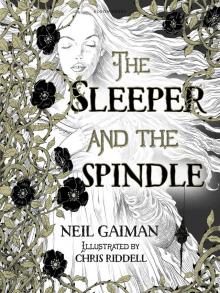 The Sleeper and the Spindle
The Sleeper and the Spindle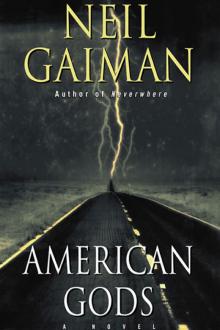 American Gods
American Gods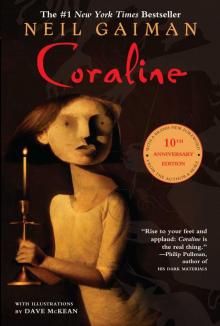 Coraline
Coraline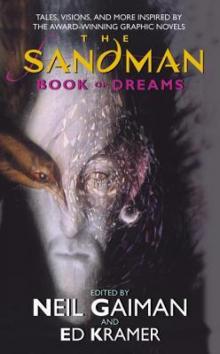 The Sandman: Book of Dreams
The Sandman: Book of Dreams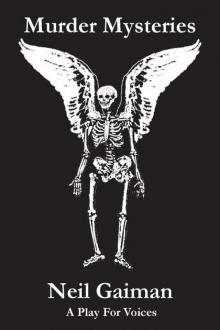 Murder Mysteries
Murder Mysteries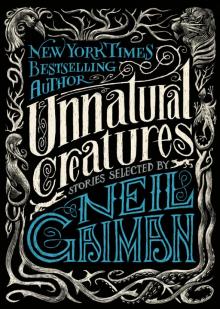 Unnatural Creatures
Unnatural Creatures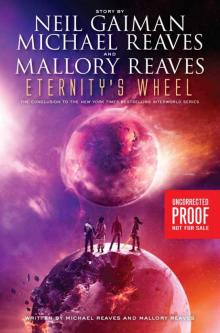 Eternity's Wheel
Eternity's Wheel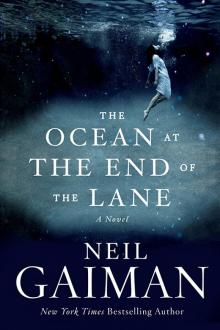 The Ocean at the End of the Lane
The Ocean at the End of the Lane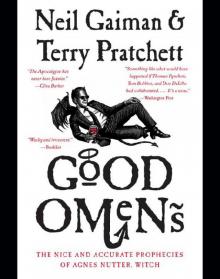 Good Omens
Good Omens Stardust
Stardust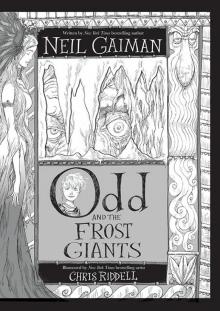 Odd and the Frost Giants
Odd and the Frost Giants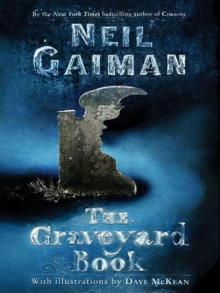 The Graveyard Book
The Graveyard Book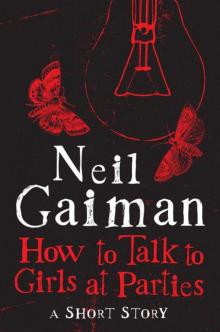 How to Talk to Girls at Parties
How to Talk to Girls at Parties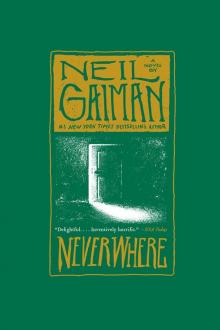 Neverwhere
Neverwhere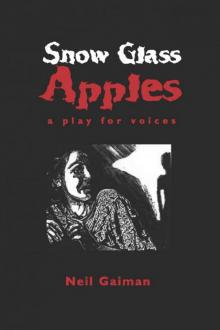 Snow, Glass, Apples
Snow, Glass, Apples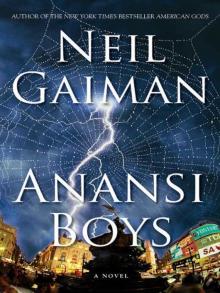 Anansi Boys
Anansi Boys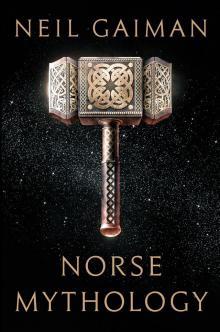 Norse Mythology
Norse Mythology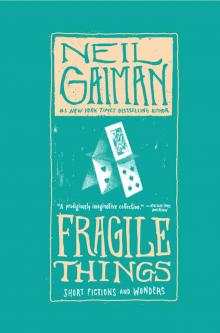 Fragile Things: Short Fictions and Wonders
Fragile Things: Short Fictions and Wonders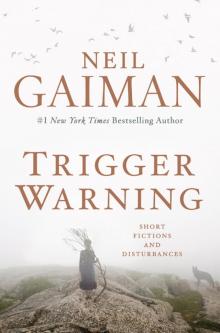 Trigger Warning: Short Fictions and Disturbances
Trigger Warning: Short Fictions and Disturbances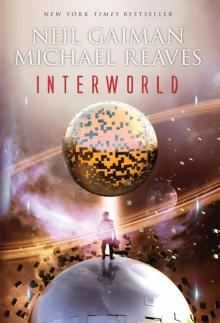 InterWorld
InterWorld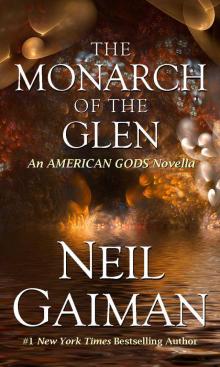 The Monarch of the Glen
The Monarch of the Glen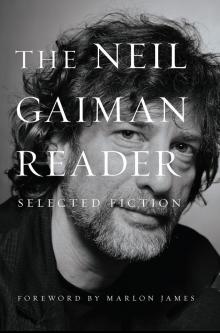 The Neil Gaiman Reader
The Neil Gaiman Reader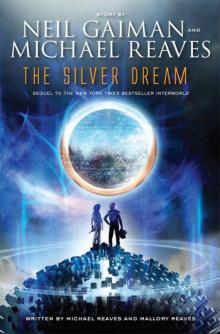 The Silver Dream
The Silver Dream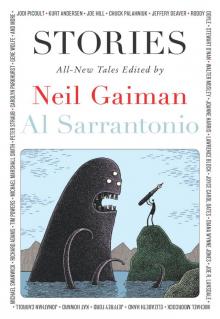 Stories
Stories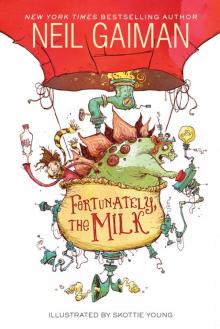 Fortunately, the Milk
Fortunately, the Milk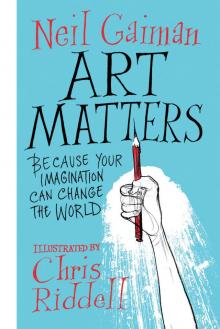 Art Matters
Art Matters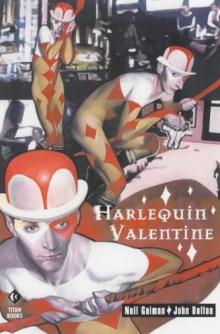 Harlequin Valentine
Harlequin Valentine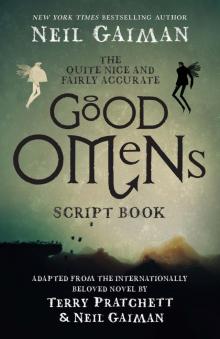 The Quite Nice and Fairly Accurate Good Omens Script Book
The Quite Nice and Fairly Accurate Good Omens Script Book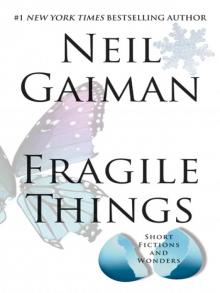 Fragile Things
Fragile Things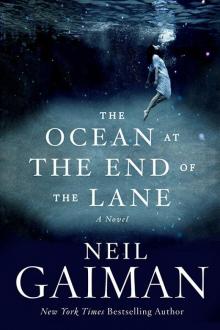 The Ocean at the End of the Lane: A Novel
The Ocean at the End of the Lane: A Novel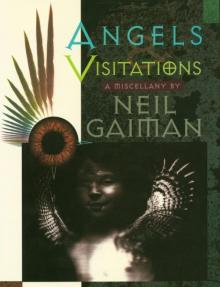 Angels and Visitations
Angels and Visitations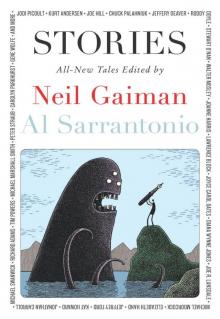 Stories: All-New Tales ngss-1
Stories: All-New Tales ngss-1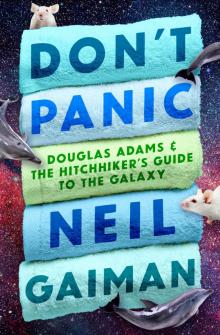 Don't Panic
Don't Panic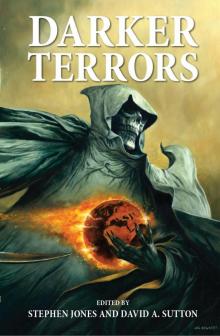 Darker Terrors
Darker Terrors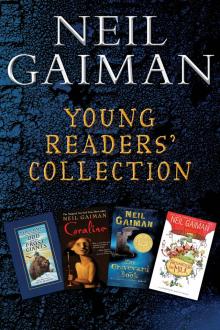 Neil Gaiman Young Readers' Collection
Neil Gaiman Young Readers' Collection A Study In Emerald
A Study In Emerald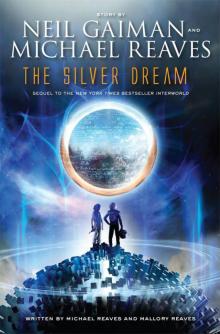 The Silver Dream: An InterWorld Novel
The Silver Dream: An InterWorld Novel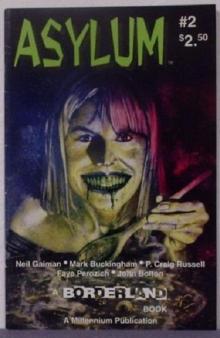 Feeders and Eaters
Feeders and Eaters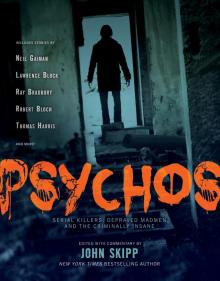 Psychos
Psychos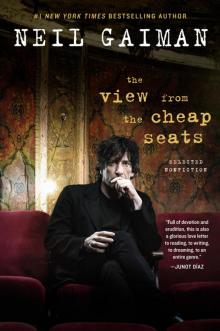 The View from the Cheap Seats
The View from the Cheap Seats Trigger Warning
Trigger Warning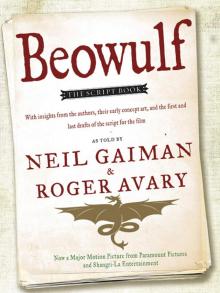 Beowulf
Beowulf Nessun Dove
Nessun Dove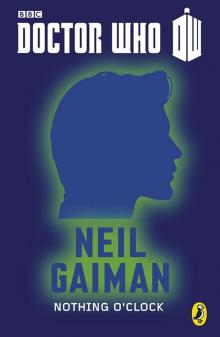 Doctor Who: Nothing O'Clock: Eleventh Doctor: 50th Anniversary
Doctor Who: Nothing O'Clock: Eleventh Doctor: 50th Anniversary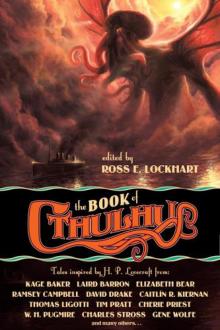 The Book of Cthulhu
The Book of Cthulhu